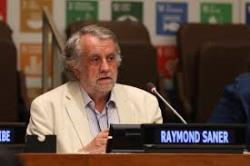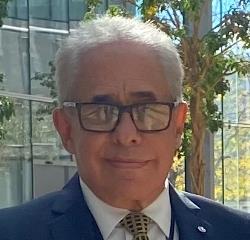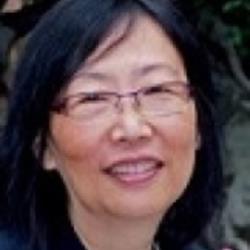Embracing Multigenerational Digital Collaboration: Shaping the Future of Work
The Centre for Socio-Eco-Nomic Development
Session 297
Fit for Each Other? Multi-Generational Cooperation with Generative AI
This session is part of the CSEND-WSIS Series on "ICTs and Integrational Partnerships for a Sustainable Future" (IIPSF) initiated in 2023. IIPSF 2024 will explore the impact of an extended life course on established societal roles and norms and how digitalisation and generative AI can generate beneficial multi-generational co-existence and interaction. The scope of this session will focus on the multi-generational workplace. According to sociologists, the workplace can contain up to 8 different generations of workers.
Related to this central theme, there are two sub-questions for discussion:
1) How does the quality of multigenerational interactions affect the wellbeing and performance of the workplace - employees, employers and owners of enterprises?
2) How do digital technology and generative AI contribute to a more constructive and purposeful multigenerational collaboration and communication within an organisation?
These two questions will be discussed from different perspectives representing psychology, economics, sociology and technology.
After a brief introduction by the chair, each speaker will have 3 minutes to introduce his/her view on both questions followed by a round of interaction between panel members. The audience will be invited to join the debate subsequently.
Prof Raymond Saner, University of Basle and Centre for Socio-Eco-Nomic Development (CSEND) will chair the session.

Raymond Saner is titular Professor at Basel University (Economics Department) and has been teaching at Sciences Po, Paris (Public Policy) and at Lüneburg University (Environmental Negotiations). His research projects focus on sustainable development, international relations, trade and public administration. He is co-founder of CSEND, a Geneva based NGDRO (Non-Governmental Research and Development organisation), accredited by UN ECOSOC with special consultative status and expert working for international organisations, national governments and CSO organisations.
Raymond Saner is representative to the UN in Genva for the International Association of Applied Psychology (IAAP) and has been a long-time member of the International Institute of Administrative Sciences (IIAS). He participates in the United Nations Taskforce on Social and Solidarity Economy (UNTFSSE), was member of the Bureau of UNECE’s PPP Unit, works for UNDESA on projects relating to the 2030 Agenda and the 17 SDGs and is a scholar in the field of international negotiations and conflict resolution.

Dr Vitalija Gaucaite was responsible for UNECE’s work on population ageing and intergenerational relations. She coordinated the activities of the UNECE Standing Working Group on Ageing and oversaw the organization of the reviews of national policies and strategies in implementing the Madrid International Plan of Actions on Ageing (MIPAA, 2002) in the UNECE region, capacity development and publication of policy briefs in the area of population ageing. She also acted as the UNECE coordinator for the Generations and Gender Programme. In addition, she led UNECE activities related to the review of implementation of the Programme of Action of International Conference on Population and Development (ICPD, 1994). Prior to joining the Population Unit in October 2010, Ms. Gaucaite Wittich worked in the Statistics and Economic Analysis Divisions of UNECE. Ms. Gaucaite Wittich has a doctoral degree in Social sciences and before joining UNECE was an Associate Professor of Economics at Vilnius University in Lithuania.

Prof Borisch is a global public health expert. She has a long experience in collaborating with international organizations, both at the UN level as well as at the European level. She also serves in different functions in the NGO sphere, such as President of Europa Donna, CEO of the World Federation of Public Health Associations, and board member of several other Public Health organizations.
She is a professor em. of Public Health at the Institute of Global Health, Medical Faculty, University of Geneva. She now leads the World Federation of Public Health Associations. A medical doctor by training she first specialized in clinical pathology and was the director of the Institute of Clinical Pathology, University of Geneva before orienting her work to Public Health. Her research interests include gender health, health systems, universal health coverage and health governance. In her life as a histopathologist, she was involved in cancer research with an emphasis on Non-Hodgkin-Lymphomas and other neoplastic lesions such as breast cancer. This led up to her public health work in breast cancer screening, early diagnosis and treatment. More recently she focusses on data, AI and Public Health.

Dr. Alejandro Bonilla-Garcia, with dual Mexican and Swiss nationality, earned degrees in actuarial studies and applied mathematics from Anahuac University and the University of Toulouse, respectively. His distinguished career at the ILO included roles such as Senior Actuary and Director of Social Protection. Post-ILO, he became a Senior Actuarial Consultant for the Permanent Mission of Mexico in Geneva. He is currently the President of Greycells and is active in multiple professional associations.

Lichia Saner-Yiu has over 30 years of experience as an advisor to governments and international organisations on organisation development and reform of public administration and services. She has also been a consultant to the United Nations Development Programme and other specialised UN agencies, as well as to private sector organisations. Her recent engagement was to curate and facilitate the Executive Training Course for the Policy Makers on 2030 Agenda for Sustainable Development hosted by the UNOSD, Incheon, Korea.
She was an accredited lead auditor on human resource development and quality assurance system for return on training investment at both individual and organisational level. She also consulted governments in strengthening their higher education performance and governance.
She holds a doctorate in Educational Psychology from Indiana University and was a postdoctoral fellow at Columbia University in organisational psychology.
-
 C4. Capacity building
C4. Capacity building
-
 C7. ICT applications: benefits in all aspects of life — E-government
C7. ICT applications: benefits in all aspects of life — E-government
-
 C7. ICT applications: benefits in all aspects of life — E-business
C7. ICT applications: benefits in all aspects of life — E-business
-
 C7. ICT applications: benefits in all aspects of life — E-health
C7. ICT applications: benefits in all aspects of life — E-health
-
 C10. Ethical dimensions of the Information Society
C10. Ethical dimensions of the Information Society
With the WSIS Action Lines, several are related to multigenerational interactions and workplace dynamics, particularly those focused on leveraging information and communication technologies for social and economic development.
Changing demographics affect significant changes in all aspects of life from administration to mobility and the portfolio of public services including private leisure time. Therefore the links of this session to the following action lines are multifaceted, systemic and consequential. They are: C4 building capacities in ICT related skills and knowledges, especially through workplace learning, peer-to-peer coaching between generations; C7 ICT Applications that improve efficiency, effectiveness, coverage and user experiences in all aspects of social-economic activities; C10: Ensuring ethical dimensions of the information society through multigenerational stakeholder dialogues and co-designing the ICT applications and monitoring mechanisms; C13: Building confidence and security in the use of ICTs by multigenerational cooperation and mutual learning.
-
 Goal 3: Ensure healthy lives and promote well-being for all
Goal 3: Ensure healthy lives and promote well-being for all
-
 Goal 5: Achieve gender equality and empower all women and girls
Goal 5: Achieve gender equality and empower all women and girls
-
 Goal 8: Promote inclusive and sustainable economic growth, employment and decent work for all
Goal 8: Promote inclusive and sustainable economic growth, employment and decent work for all
-
 Goal 16: Promote just, peaceful and inclusive societies
Goal 16: Promote just, peaceful and inclusive societies
This session will discuss how ICT impacts existing roles, definitions and norms and emerging new economies and opportunities. The silver economy and the spread of ICT-based production systems and jobs demand different skills from all workers.
No matter whether these jobs will be at the entry-level to supervisory and executive levels, the requisite skills will reflect higher functional capacities in the cognitive and affective domains. These competence transitions included both explicit and implicit know-how. The formal are more universal while the latter are contextual and specific. Thus workplace planning between generations becomes an important channel to sustain and continuously improve on the core competence of any organisation.
This session will address SDG 3 workplace well-being, SDG 5 gender equality, SDG 8 decent work and economic growth and SDG 16 Just, peaceful and inclusive workplace.